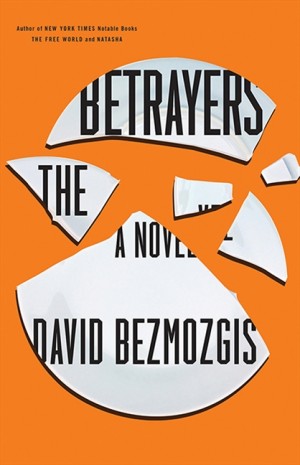You have no items in your cart. Want to get some nice things?
Go shopping From title to setup, David Bezmozgis’ The Betrayers initially comes across as some sort of John le Carré-style spy novel. Branded a “moral thriller”, the book follows disgraced Israeli politician Baruch Kotler to Crimea, where he has fled with his young mistress under a cloud of suspicion and intrigue. We learn that a Mossad agent had tried to blackmail Kotler in an attempt to silence his opposition to an Israeli withdrawal from the occupied territories – when Kotler refused to back down, his affair was made public, precipitating a speedy departure from the country.
From title to setup, David Bezmozgis’ The Betrayers initially comes across as some sort of John le Carré-style spy novel. Branded a “moral thriller”, the book follows disgraced Israeli politician Baruch Kotler to Crimea, where he has fled with his young mistress under a cloud of suspicion and intrigue. We learn that a Mossad agent had tried to blackmail Kotler in an attempt to silence his opposition to an Israeli withdrawal from the occupied territories – when Kotler refused to back down, his affair was made public, precipitating a speedy departure from the country.
Kotler, readers are told, found political fame and currency following his release from a 13-year prison stint in the Soviet Union. In an unlikely coincidence, Kotler and his mistress Leora eventually end up lodging at the house of the man who betrayed him to the KGB all those years ago, Vladimir Tankilevich. One imagines the first encounter between these two enemies to end in smashed furniture and blood on the walls. Instead, Kotler is philosophical: “I had visions of something grand and involved, but likely it will be nothing of the kind. As is often the case in life, one imagines an opera and gets an operata.”
Despite moments of such explosive potential, The Betrayers is a relatively quiet novel. The simple plot opens the reader up to the complexities of moral philosophy. And — as is typical in this and other areas of philosophy — there are many more questions than there are answers:
Who is the real victim? Who is the real perpetrator? Who gets to sit in judgement? Who? Everyone. And only a child or a simpleton bemoans it. To sit in judgement without all the facts? Who ever sat in judgement with all the facts?
The lines are further blurred by Tankilevich, who sees himself as the victim in this situation. Not only does he not feel guilty, but he also believes that Kotler should publicly absolve him so that he might migrate to Israel.
Though Bezmozgis is far too good a writer to reduce his characters to mouthpieces for moral arguments, they can often feel secondary to the author’s own meditations on right and wrong. This is especially problematic with Kotler: the fact that he is so eloquent and precise in his choice of words makes it hard to see him as a man of flesh and blood. The novel’s prose is simple and reporterly, even when describing characters’ feelings and emotions, which makes it difficult to get close to them.
Whilst the characters aren’t strong enough to live on outside the page, their motivation and rationales are open to endless ethical scrutiny. Even beyond The Betrayers‘ final page, the significance of the title remains ambiguous: “betrayers” is plural, and it does not refer to Tankilevich alone. Kotler is a traitor too: most obviously, his affair is a betrayal of his wife. However, by refusing to betray his principles and give in to political intimidation, he has arguably also betrayed his family by embroiling them in his now very public disgrace.
Our thoughts about Tankilevich’s betrayal also change as we learn that he framed Kotler because the KGB threatened to kill his brother. Both Tankelivch and Kotler are Zionists – yet one betrayed his principles to save his family, whilst the other refused and put his family in danger.
But who cares about this country if it destroys our family? The country doesn’t care… You’ve sacrificed and sacrificed for this country, but still they ridicule you.
The Betrayers recalls a thought experiment from moral philosophy which posits the following: David arrives at his friend John’s house and begs John to hide him. John agrees. A few minutes later, a mad axe murderer shows up and asks John if he knows where David is. What should John tell the axe man? The positive and negative aspects of The Betrayers spell out the positives and negatives of this thought experiment. If you approach this thought experiment as a story, you’re not likely to be very invested in David, John or the mad axe man as characters. However, the power of both novel and thought experiment derives from the ethical possibilities they present. This novel finds its real power, then, after the reading has finished and the pondering begins. Like the Israeli-Palestinian conflict (which it can be read as an allegory for) nothing is clear cut and the debate seems endless.
About Adam Ley-Lange
Adam Ley-Lange lives and writes in Edinburgh. He's currently trying to find an agent for his first novel, whilst working on his second. Adam is also an editor for Structo Magazine, which publishes short fiction, essays and poetry.





“This novel finds its real power, then, after the reading has finished and the pondering begins.” You said it better than me, but I completely and thoroughly agree: https://fashioningfiction.com/the-betrayers-david-bezmozgis/